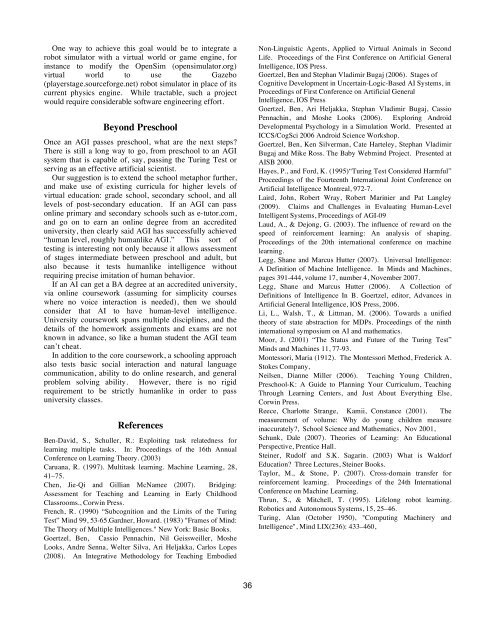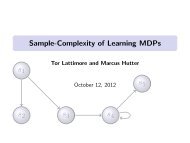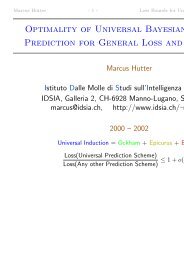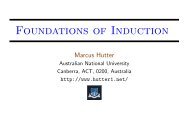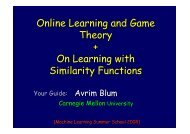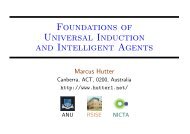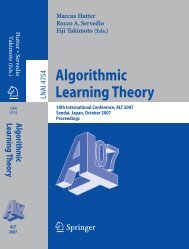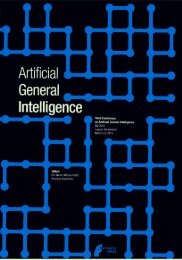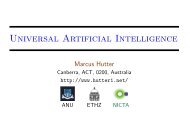A Framework for Evaluating Early-Stage Human - of Marcus Hutter
A Framework for Evaluating Early-Stage Human - of Marcus Hutter
A Framework for Evaluating Early-Stage Human - of Marcus Hutter
You also want an ePaper? Increase the reach of your titles
YUMPU automatically turns print PDFs into web optimized ePapers that Google loves.
One way to achieve this goal would be to integrate a<br />
robot simulator with a virtual world or game engine, <strong>for</strong><br />
instance to modify the OpenSim (opensimulator.org)<br />
virtual world to use the Gazebo<br />
(playerstage.source<strong>for</strong>ge.net) robot simulator in place <strong>of</strong> its<br />
current physics engine. While tractable, such a project<br />
would require considerable s<strong>of</strong>tware engineering ef<strong>for</strong>t.<br />
Beyond Preschool<br />
Once an AGI passes preschool, what are the next steps?<br />
There is still a long way to go, from preschool to an AGI<br />
system that is capable <strong>of</strong>, say, passing the Turing Test or<br />
serving as an effective artificial scientist.<br />
Our suggestion is to extend the school metaphor further,<br />
and make use <strong>of</strong> existing curricula <strong>for</strong> higher levels <strong>of</strong><br />
virtual education: grade school, secondary school, and all<br />
levels <strong>of</strong> post-secondary education. If an AGI can pass<br />
online primary and secondary schools such as e-tutor.com,<br />
and go on to earn an online degree from an accredited<br />
university, then clearly said AGI has successfully achieved<br />
“human level, roughly humanlike AGI.” This sort <strong>of</strong><br />
testing is interesting not only because it allows assessment<br />
<strong>of</strong> stages intermediate between preschool and adult, but<br />
also because it tests humanlike intelligence without<br />
requiring precise imitation <strong>of</strong> human behavior.<br />
If an AI can get a BA degree at an accredited university,<br />
via online coursework (assuming <strong>for</strong> simplicity courses<br />
where no voice interaction is needed), then we should<br />
consider that AI to have human-level intelligence.<br />
University coursework spans multiple disciplines, and the<br />
details <strong>of</strong> the homework assignments and exams are not<br />
known in advance, so like a human student the AGI team<br />
can’t cheat.<br />
In addition to the core coursework, a schooling approach<br />
also tests basic social interaction and natural language<br />
communication, ability to do online research, and general<br />
problem solving ability. However, there is no rigid<br />
requirement to be strictly humanlike in order to pass<br />
university classes.<br />
References<br />
Ben-David, S., Schuller, R.: Exploiting task relatedness <strong>for</strong><br />
learning multiple tasks. In: Proceedings <strong>of</strong> the 16th Annual<br />
Conference on Learning Theory. (2003)<br />
Caruana, R. (1997). Multitask learning. Machine Learning, 28,<br />
41–75.<br />
Chen, Jie-Qi and Gillian McNamee (2007). Bridging:<br />
Assessment <strong>for</strong> Teaching and Learning in <strong>Early</strong> Childhood<br />
Classrooms., Corwin Press.<br />
French, R. (1990) “Subcognition and the Limits <strong>of</strong> the Turing<br />
Test” Mind 99, 53-65.Gardner, Howard. (1983) "Frames <strong>of</strong> Mind:<br />
The Theory <strong>of</strong> Multiple Intelligences." New York: Basic Books.<br />
Goertzel, Ben, Cassio Pennachin, Nil Geissweiller, Moshe<br />
Looks, Andre Senna, Welter Silva, Ari Heljakka, Carlos Lopes<br />
(2008). An Integrative Methodology <strong>for</strong> Teaching Embodied<br />
36<br />
Non-Linguistic Agents, Applied to Virtual Animals in Second<br />
Life. Proceedings <strong>of</strong> the First Conference on Artificial General<br />
Intelligence, IOS Press.<br />
Goertzel, Ben and Stephan Vladimir Bugaj (2006). <strong>Stage</strong>s <strong>of</strong><br />
Cognitive Development in Uncertain-Logic-Based AI Systems, in<br />
Proceedings <strong>of</strong> First Conference on Artificial General<br />
Intelligence, IOS Press<br />
Goertzel, Ben, Ari Heljakka, Stephan Vladimir Bugaj, Cassio<br />
Pennachin, and Moshe Looks (2006). Exploring Android<br />
Developmental Psychology in a Simulation World. Presented at<br />
ICCS/CogSci 2006 Android Science Workshop.<br />
Goertzel, Ben, Ken Silverman, Cate Harteley, Stephan Vladimir<br />
Bugaj and Mike Ross. The Baby Webmind Project. Presented at<br />
AISB 2000.<br />
Hayes, P., and Ford, K. (1995)“Turing Test Considered Harmful”<br />
Proceedings <strong>of</strong> the Fourteenth International Joint Conference on<br />
Artificial Intelligence Montreal, 972-7.<br />
Laird, John, Robert Wray, Robert Marinier and Pat Langley<br />
(2009). Claims and Challenges in <strong>Evaluating</strong> <strong>Human</strong>-Level<br />
Intelligent Systems, Proceedings <strong>of</strong> AGI-09<br />
Laud, A., & Dejong, G. (2003). The influence <strong>of</strong> reward on the<br />
speed <strong>of</strong> rein<strong>for</strong>cement learning: An analysis <strong>of</strong> shaping.<br />
Proceedings <strong>of</strong> the 20th international conference on machine<br />
learning.<br />
Legg, Shane and <strong>Marcus</strong> <strong>Hutter</strong> (2007). Universal Intelligence:<br />
A Definition <strong>of</strong> Machine Intelligence. In Minds and Machines,<br />
pages 391-444, volume 17, number 4, November 2007.<br />
Legg, Shane and <strong>Marcus</strong> <strong>Hutter</strong> (2006). A Collection <strong>of</strong><br />
Definitions <strong>of</strong> Intelligence In B. Goertzel, editor, Advances in<br />
Artificial General Intelligence, IOS Press, 2006.<br />
Li, L., Walsh, T., & Littman, M. (2006). Towards a unified<br />
theory <strong>of</strong> state abstraction <strong>for</strong> MDPs. Proceedings <strong>of</strong> the ninth<br />
international symposium on AI and mathematics.<br />
Moor, J. (2001) “The Status and Future <strong>of</strong> the Turing Test”<br />
Minds and Machines 11, 77-93.<br />
Montessori, Maria (1912). The Montessori Method, Frederick A.<br />
Stokes Company,<br />
Neilsen, Dianne Miller (2006). Teaching Young Children,<br />
Preschool-K: A Guide to Planning Your Curriculum, Teaching<br />
Through Learning Centers, and Just About Everything Else,<br />
Corwin Press.<br />
Reece, Charlotte Strange, Kamii, Constance (2001). The<br />
measurement <strong>of</strong> volume: Why do young children measure<br />
inaccurately?, School Science and Mathematics, Nov 2001,<br />
Schunk, Dale (2007). Theories <strong>of</strong> Learning: An Educational<br />
Perspective, Prentice Hall.<br />
Steiner, Rudolf and S.K. Sagarin. (2003) What is Waldorf<br />
Education? Three Lectures, Steiner Books.<br />
Taylor, M., & Stone, P. (2007). Cross-domain transfer <strong>for</strong><br />
rein<strong>for</strong>cement learning. Proceedings <strong>of</strong> the 24th International<br />
Conference on Machine Learning.<br />
Thrun, S., & Mitchell, T. (1995). Lifelong robot learning.<br />
Robotics and Autonomous Systems, 15, 25–46.<br />
Turing, Alan (October 1950), "Computing Machinery and<br />
Intelligence", Mind LIX(236): 433–460,


